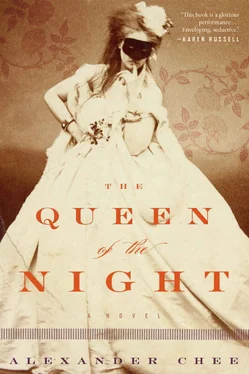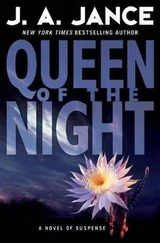I raised my glass and touched it to his, and it did not shake.
I would not have this amant de coeur staying past sunset, he said. I looked away at this to treat it as ridiculousness, but it was generous and surprised me. He raised his glass to his mouth.
Of course, I said to the tenor. And never past sunset. For my accompanist.
Good girl, he said. Thank you. I’m moved by the thoroughness of your preparations for this role. He brushed his hands on his napkin and then lifted the spoon to his soup at last. I will help.
I would never ask—
You’re not asking, my love. I insist. I know the Elvino role quite well. He smiled at me, glittering through the dark. We’ll begin the day after tomorrow. That way you can tell your pianist to prepare.
Amant de coeur —this lover, he pays nothing, he visits only after the others have their fill of you, he must not interfere. You never give him a ride in a carriage provided to you by another lover, you never make a gift to him of anything that was given to you. You never entertain him at any hour the others might prefer. The affair is tolerated entirely on the premise that it exists in the realm of pure love, untainted by the touch of money, and so, this amant is envied, of course, and so it is better if his identity is unknown, but it is good for a courtesan’s reputation if she is thought to have one of these, it shows she has the normal emotions. The fantasy is then alive for her other lovers, that if circumstances were different it might be any of them who held court in her heart instead of him.
Of course, if a man has a courtesan, he does not more than tolerate the fantasy that her love could be freely given.
It was time for me to have something only for me.
You must always leave before sunset, I told Aristafeo as we sat at the piano, and he played for me again.
Is he a vampire, then?
I smiled as I considered this. I saw myself in black, the needle of prussic acid at my fingertip. No, I said. It would be easier if he were.
He kept playing.
He knows that we’ve been rehearsing, I said.
I thought as much.
That he knew—
It does not surprise me.
Several bars passed before we spoke again.
He will join us tomorrow, as well, I said. To sing Elvino.
He nodded without comment.
I returned my attention to the music. You are composing this now? I asked.
Yes, he said. You’re too kind, however. It’s terrible.
No, it’s not, I said. But now you must make an opera with a role for me, for I have said you are.
Is it just music for now, or is there a libretto?
I did not answer; instead, I listened to him play for nearly an hour more like this.
Escape with me, I said. Can it be done? Could we leave now?
The light shadowed his face. He seemed to be thinking of it, but he had not answered immediately, and I instantly doubted myself. You are asking me, he said, but you, I think, are the escape artist.
What will you say to him tomorrow, I asked, when he asks you about the opera I have said you are writing for me?
But I am still planning our escape, he said, his smile like thunder.
§
I found Amina first in the wig room at Pauline’s Baden-Baden Haustheater, one wig among many on the shelves of blank-faced wooden mannequin heads, some with their eyes scrawled in with pen to make hideous glares, jowls, sly winks. Or rather, she had found me. I had not known it was one of Pauline’s most famous roles, that it nearly belonged to her. Under each wig was a card with the name. Madame Viardot walked purposely toward this one, with black curls in a ridiculous pile, almost like shearling. Small pink satin bows glowed here and there among the ringlets.
Amina, the name read. She shook the wig at me.
I took it from her and held it up, examining it from underneath. There were small loops to pull it with. It was a small cap sewn with hair.
Put it on, Madame Viardot commanded. There’s not much trick to it. She walked over as if to help me.
I slid it over my head.
I pushed and pulled at it to settle it into place. When I looked into the mirror, I had the oddest experience when it was in place. I knew exactly how to smile, different from my own smile. As if the wig were a door for this other girl to walk through the moment I wore her hair.
I went home with the libretto and the music, a little afraid of it.
The opera began in a village haunted by the ghost of an angry young woman, her eyes on fire, her hair like smoke as she ran the streets at night. She is not a ghost, though, but a sleepwalker, an orphan girl engaged to be married to the town’s most handsome and suitable bachelor. One night she walks all the way to the hotel room of a visiting gentleman and awakes to find herself in his bed. This sets in motion a plot that unravels her engagement — she is thought to be untrue to her fiancé, Elvino, who breaks their engagement. As he prepares to marry her rival, she tries desperately to prove herself to him, failing until, as he marches to his wedding, he sees her asleep, walking the roof of the town’s mill, singing in her sleep of her love for him. He rushes to her side to rescue her from falling to her death, and she wakes to find herself in his arms.
It was ridiculous, and yet the music was extraordinary, and I loved it — and it was not Il Trovatore. I had found a role to focus me that was neither the role I lived for nor lived inside of.
The tenor had adjusted his disappointment and kept assuring me we would perform this together at the Paris Opera next spring as my debut, a season I doubted would come. And yet I knew there was the slightest chance that I would still be allowed to debut, and so I knew there was nothing else for me to do. Whatever was to happen to Paris, it was time to leave. He would wait for us in the music room; I would be gone. And would try to convince Aristafeo to come with me.
§
The next morning, after the tenor had left, I asked Lucy to have the phaeton rigged up, then thought better of it and asked for just my horse.
I wore the general’s coat, my jewels bound in plain pouches hidden at my waist and ankle. My face hid even the slightest hint of a good-bye. Until later, I said.
Pardon me, but if I may say something, Lucy said.
By all means, I said.
Take a driver, she said. Or perhaps your horse won’t be there when you return. If you take ours, he may still sell it while you’re away, but if you tip him, he may fight for the horse and wait for you.
I hired a driver to take me to the Place Vendôme instead; and near there, at a chapel I didn’t recognize, I asked the driver to stop.
I haven’t had confession, I said, and stepped out of the carriage, though I didn’t need to explain to him.
In case I was being followed, I entered the church, slipped a few sous from my purse into the slot by the door, and took a candle, following the line of women ahead of me, kneeling and lighting it, crossing myself as the sisters had taught me. I looked up. A figure I didn’t recognize presided above a thick field of candles — so many had come to ask for favors, the flames had the warmth of a hearth fire, so I lingered until the women behind me glared and then I left to find Aristafeo.
There were no men in the line as I passed out of the church; the men of age to fight were at war. We were a city of women, children, and old men. The streets had filled with garbage that was no longer collected. The stench overpowered any fear I had of being caught.
At the address Aristafeo had given me in the Marais, I found an elegant town house within a courtyard, which impressed me. I rang the plain bell knocker and heard the sounds of dogs running and barking inside, vicious. I drew back from the entrance and was close to leaving when he pushed his face out, straining with the exertion of holding back two large black dogs. One moment! he said. And then his face vanished as the door closed again. I could hear the yelping and begging of the dogs and his voice, weary as he spoke to them in stern, swift Spanish until they were quiet.
Читать дальше












